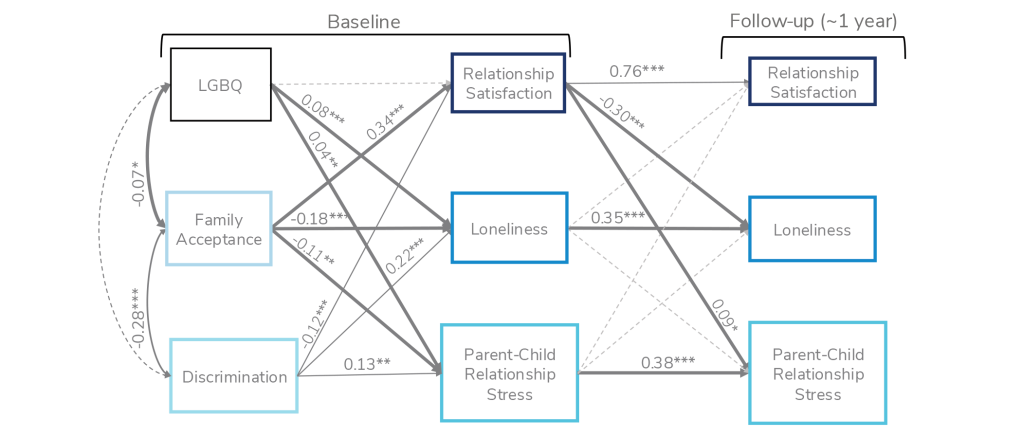A longitudinal examination of family relationship quality, loneliness, and marginalization among sexually diverse parents
Principal Investigator

Claire Kamp Dush
Professor of Sociology, Minnesota Population Center, University of Minnesota
Principal Investigator

Ann Meier
Professor of Sociology, Associate Dean, Research and Graduate Programs, University of Minnesota
Co-Investigators
- Sierra Clark, Graduate Research Assistant, University of Minnesota
- Hyunjae Kwon, Graduate Research Assistant, University of Minnesota
- Alexandra VanBergen, Research Scientist, Minnesota Population Center, University of Minnesota
Funded By
Eunice Kennedy Shriver National Institute of Child Health and Human Development (NICHD)
The problem:
Sexual and gender diverse (SGD; e.g., LGBTQ+) individuals face unique stressors due to cis-heterosexism, or the marginalization of non-heterosexual identities and transgender and nonbinary identities. This stress can undermine the quality of relationships between individuals who are SGD and their family members or partners.
The Minority Stress Model argues that the stress associated with marginalization impacts relationship quality, health, and mental health. Family Systems Theory posits that when one family member experiences stress, this stress can influence not only one’s health and relationship quality, but the health and relationship quality of their family members. Using these theoretical models, Kamp Dush, Meier, and colleagues examine the association between marginalization and parent-child relationship stress, loneliness, and couple relationship satisfaction among sexual and gender diverse parents and cis-heterosexual parents.
The approach:
The research team developed and conducted the National Couples’ Health and Time Study (NCHAT), a nationally representative study of people aged 20-60 who were in relationships—same or different gender, married or cohabitating. The NCHAT sample includes 3,642 main respondents and 1,515 spouses/partners. The baseline survey was distributed to respondents from September 2020 to April 2021. A follow-up survey was then also conducted from February 2022 to April 2022. The sample for this research (n=970) was restricted to parents of children under the age of 18 who were residing in the household.
The survey included questions on:
• family and relationship quality indicators, such as relationship stress with children,
• couple satisfaction,
• loneliness, and
• marginalization indicators, such as, are your family members accepting of your current partner as part of the family (i.e., family acceptance).
The research team ran an auto-regressive cross lagged model to examine the longitudinal associations between marginalization, loneliness, couple relationship quality, and parent-child relationship stress among all parents with a focus on differences in sexual identity.
The findings:
Preliminary findings indicate that family acceptance of sexual and gender diverse identities may explain disparities in loneliness and parent-child relationship stress. The research team found that family acceptance was higher among cis-heterosexual parents than sexual and gender diverse parents. Lower family acceptance was indirectly associated with higher loneliness at followup through lower levels of relationship satisfaction and higher levels of loneliness at baseline.
Lower family acceptance was also indirectly associated with parent-child relationship stress at follow-up through lower levels of relationship satisfaction and higher levels of parent-child relationship stress at baseline. These findings suggest that it is not one’s identity, per se, at the root of family relationship stress, but rather it is stress processes—in this case cis-heterosexism—that generate family relationship stress.

A figure titled “Structural equation modeling of family relationship quality, loneliness, and marginalization.” The figure illustrates a structural equation model of family relationship quality indicators, loneliness factors, and marginalization indicators among LGBQ parents. LGBQ parents reported lower family acceptance, higher loneliness, and higher parent–child relationship stress at baseline than heterosexual parents. Lower family acceptance was indirectly associated with higher loneliness through lower levels of relationship satisfaction and higher levels of loneliness at baseline. Lower family acceptance was indirectly associated with parent–child relationship stress through lower levels of relationship satisfaction and higher levels of parent–child relationship stress at baseline.
Selected Publications & Presentations
Bates, A. J., Kamp Dush, C. M., & Manning, W. D. (2024). State-Level LGBTQ + Policies and Experiences of Interpersonal Discrimination among Sexual and Gender Minority People. Population Research and Policy Review, 43(5), 68. https://doi.org/10.1007/s11113-024-09907-1
Meier, A., Kamp Dush, C., VanBergen, A. M., Clark, S., & Manning, W. (2024). Marginalized identities, healthcare discrimination, and parental stress about COVID‐19. Journal of Marriage and Family, jomf.13023. https://doi.org/10.1111/jomf.13023